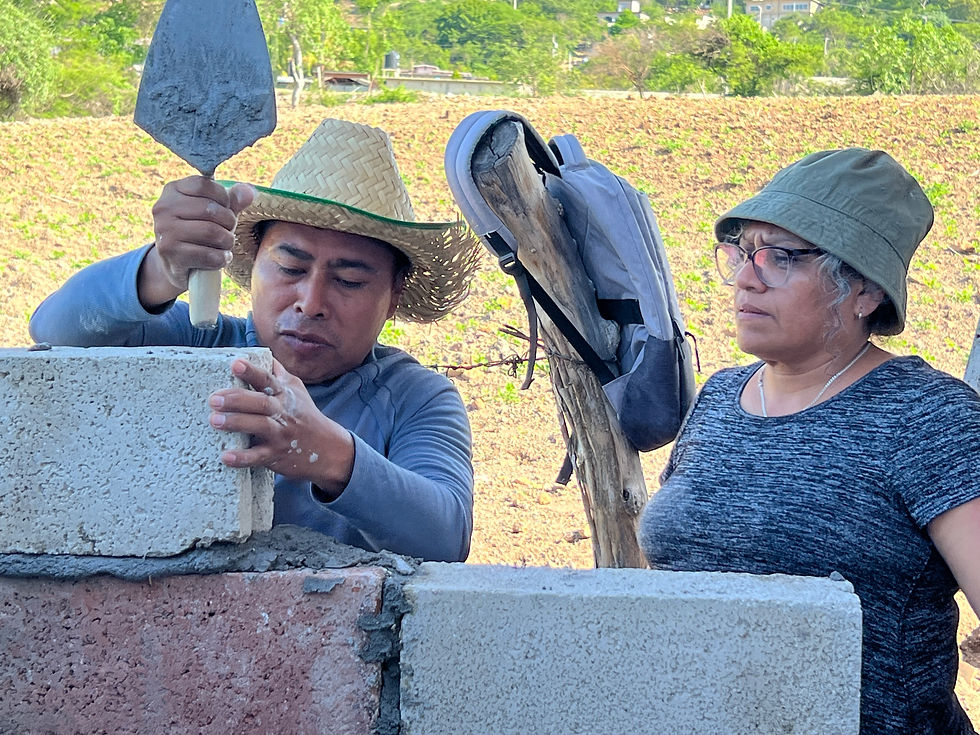Improving Life in Rural, Indigenous Communities
- Sue Smith
- Aug 17, 2023
- 4 min read
Updated: Apr 2, 2024

There are so many things in our lives that we take for granted, like running water, fuel for cooking, and a roof over our heads. Even a paved path to get to our house!
Our kitchens are part of our homes. We don’t go outside to cook over an open fire, or need to gather firewood and worry about whether it’s dry enough to start a fire so we can have a hot meal.
And we have running water and indoor plumbing. No outhouses or “bucket-flushes.” No need to go dig another hole for the latrine once one fills up.
But that’s not the case for many of our friends in other parts of the world.

Our area of expertise is migration, but global displacement is closely tied to issues of safety, security, justice, poverty, and community development, particularly in rural areas.
Back in February, we learned about efforts to address environmental concerns and community development through a United Methodist ministry, the Tree of Life Center in Puebla, Mexico. We knew that our friends in Chiapas at the Seminario Multicultural Mayense (the Mayan Intercultural Seminary, or SIM) were interested in similar types of projects, so we began to explore learning opportunities with them through the Tree of Life Center.
In July, four individuals from the SIM traveled to Puebla and spent a week in intensive training and hands-on learning that resulted in the building of a dry composting toilet for one family and an outdoor, wood-saving stove for another. Jenny Jenkins, CBF Field Personnel in Haiti, and I (Sue) trained alongside them.
The folks from the SIM returned home very excited to implement these new projects, beginning with dry composting toilets. In many areas where they work, there is a severe shortage of water, which means that flush toilets really aren’t a reality. An initial pilot project is planned for September, to build a dry composting toilet at a church that is the site of one of their current organic gardening projects.

The SIM, in San Cristobal de las Casas, focuses its work on communities throughout Los Altos de Chiapas, an area currently experiencing rapidly increasing drought conditions. The SIM’s approach to theological education and training provides a foundation that leads church leaders to engage in holistic ministry initiatives that address community needs.
The water crisis in Chiapas as well as other parts of Mexico is not new and has its roots in a shift from small-scale farming, often by indigenous populations, to large-scale agribusiness and corresponding support for policies and practices that favor agricultural, mining, and corporate interests. As this happens, people are often displaced and move higher into the mountains.
Shifting climate conditions and reduced rainfall also play a large part in the water crisis. Since 2010, there has been a significant reduction in rainfall causing periodic drought throughout the region. According to the local office the National Water Commission (Conagua) in Zinacatán, Chiapas, rainfall during 2023 has been significantly lower than normal, and by June 2023, rainfall was 75% below the monthly average.
Reduced rainfall and drought have a negative effect not only on crops but also on already overexploited aquifers and depleted reservoirs. Many springs that once produced a steady flow of water are drying up; water levels in rivers, streams, and reservoirs are affected; and a shift in the water table also results in dry wells.
Access to the water supply has not been managed well by the government. Water scarcity has contributed to a competitive market where large companies often receive preferential access to water, where farmers or cartels engage in the illegal pumping of water, and where the poorer and marginalized communities pay the price.
Thus, a major issue throughout the region of Altos de Chiapas and San Cristobal de las Casas is the scarcity of water, which makes the idea of building dry composting toilets very attractive.

The training at the Tree of Life Center has equipped ministry leaders with the necessary skills to implement the project throughout the region. And the dry composting toilet project complements a current SIM project that focuses on a return to indigenous and organic farming practices in rural communities.
And our interest in this? Ministries such as these in Chiapas and Puebla fulfill a vital role in raising awareness and educating us on current issues (in this case, the threat of a major water crisis). They also promote better, healthier living conditions in local communities, which both reduces the desire to migrate as well as makes life more bearable for those left behind.
We plan to work closely with the SIM to determine the areas of greatest need (who, where, etc.), as well as the local costs for implementing this project, so that we can offer opportunities for financial support. We currently estimate that approximately $500 is needed for building supplies for each latrine.
As these projects develop, the SIM will assess and identify the need for an additional project focusing on wood-saving stoves. We’re pleased to help empower these awesome leaders!
Training and initial start-up costs for this project have been financed by the programming budget of Sue and Greg Smith. You can contribute specifically to this project by choosing the Community Development Chiapas Project or noting Project #85071 on the memo line of your check.
For further reading, see:





Comments